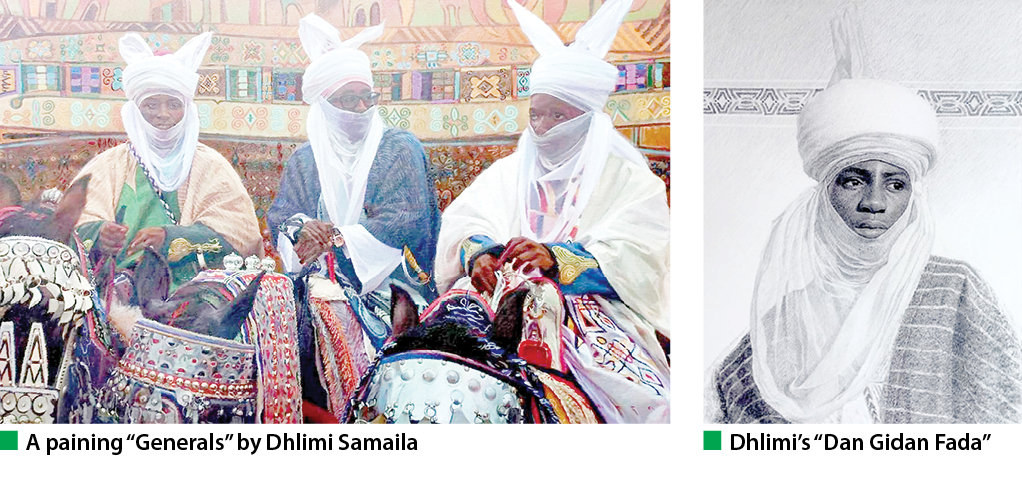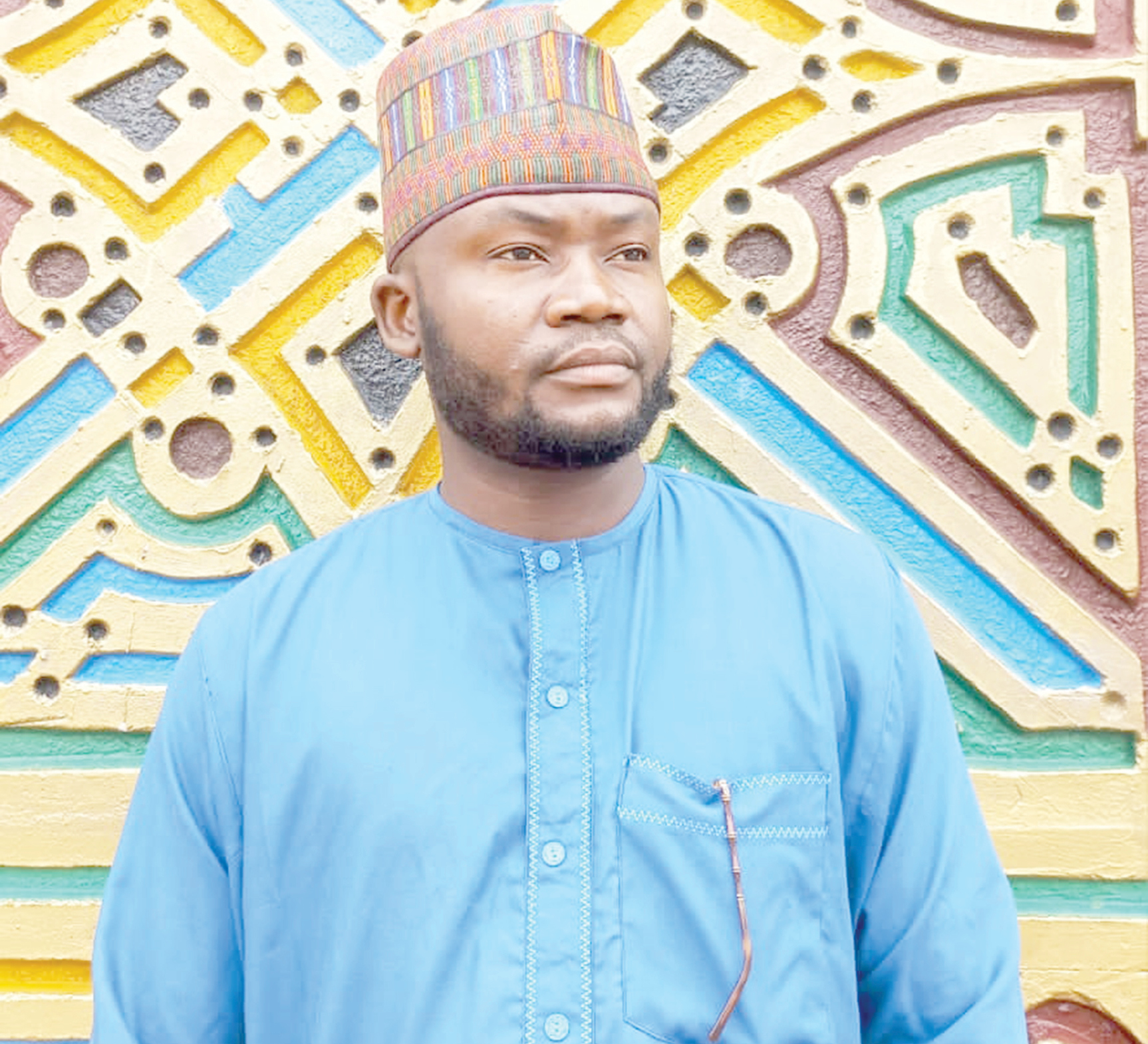Munza Dhlimi Samaila is a skilled painter with over 15 years in the art space. In this interview with Daily Trust on Sunday, Samaila gives a deeper insight into his life and his profession as an artist.
Briefly, tell us about yourself and your background?
My name is Munza Dhlimi Samaila. I was born of Bauchi parentage. I studied Fine Arts at the prestigious Ahmadu Bello University, Zaria, specialising in painting. I have been practising art since graduating in 2008.
Do you think artists are born or made?
I think artists are made more than they are born. I will discuss this through the lines of talent and hard work. As Vladislav Rastorotsky once said: “talent alone is not enough.” I believe a really good artist is 10 percent talent and inspiration, and 90 per cent perspiration and hard work! The great Pablo Picasso famously said that “Every child is an artist. The problem is how to remain an artist when we grow up.” I think Picasso meant that kids usually arrive at a point when the confidence they have in their ability to draw or create dwindles. At this stage, the joy of creating can become a frustrating endeavour as the desire to reach a perceived standard bumps up against skill limits. If artistic growth is not fostered, that spark can be extinguished in a child. With the above sentiment, the artist is ‘made’ through persistent learning, practise, and growth. That notwithstanding, there are individuals born gifted with a high level of artistic talent and ability. In the same vein, a person without any prior creative talent can, with training and dedicated practise, master the art of creating.
As an artist, how do you come up with new ideas and what inspires you?
I seek inspiration from travelling and exploring new places. It inspires me to see, taste, and try new things. Not only does that challenge me to adapt to new experiences, but also to engage with different people and embrace adventures and new ideas as they come. Listening to good music can also be very inspiring. I enjoy listening to both African and western folk music, jazz, indie hip hop, and alternative rock.
- Kogi Gov, SDP Guber Candidate Trade Blame Over Attack
- Subsidy removal: FG must commit to ameliorative policy

Working alone or in a team, what’s your preference?
I have had to work in both situations successfully, but I prefer working alone. This is because I get more focused when working in solitude than working in a team or a group. Distractions are thereby limited.
Care to share a real-life situation that inspired you or any of your works?
I enjoy attending traditional festivals. They serve as reference sources for future paintings. For example, I have been present at almost every Durbar Festival in Zaria for the past six years or more. The experience of witnessing a live Durbar Festival, looking at the procession of riders on their heavily adorned horses, the loud music that permeates the atmosphere from flutes, drums and local guitars, the colourful gowns and attires worn by the courtiers, the traditional dancers present, the Palace or Court guards (called the Dogaris in Hausa) in their embroidered draperies surrounding the Emir in a protective formation, can be very impressive and overwhelming at the same time.
What role do you think your art plays in society?
Of utmost significance, I believe my art serves and contributes to the preservation of disappearing cultures. The heavy influence of Western culture in our everyday life has left us with blurred identities, hence the importance and need to protect and conserve our dying traditions and values. It is also an expression of creativity that serves as an avenue for self-reflection or social influence.
Does your art in anyway represent your personality?
Yes, to an extent, it does, in that it is an expression of my innermost emotions and feelings. It is a statement of my beliefs, hopes, desires, fears, and interesting provocations. Simply put, my art mirrors my socio-political environment, my personal baggage, and external contemplations.
What do you enjoy most about being an artist?
Essentially, my profession gives me freedom to express my thoughts, which is very therapeutic. Plus, one gets the advantage of not being bound to one location or subject matter.
Does your art serve as therapy to you or you just see as a job?
Apart from the fact that I earn a living through practising art, the process of creating in itself contributes positively to my emotional well-being.
Do you think people often share the same thoughts with you over a piece or do they often interpret it differently?
I think because I do render my paintings and drawings in a representational style, my audience communes and understands what I attempt to convey and communicate through my work with ease. My artistic vocabulary is direct, simple, and self-evident. It is capable of expressing the enormous limitless scope of human thoughts, ideas, beliefs, values, and especially our feelings, passions, dreams, and fantasies; all fantasies; all the varied and infinite stories of humanity. Sometimes, people attach their personal meanings to the paintings beyond what inspired me to create the piece in the first place.
Have you ever had your work criticised and what was your reaction?
For a couple of times, I’ve received informed and constructive criticism from senior practicing artists, art dealers and collectors. These criticisms focused on the strengths and points that need to be improved. I’ve applied some of the suggestions to positive outcomes.
Have you held any exhibitions and what was the reception like?
My art has received good comments, reviews and reactions from the public in group shows, art auctions and exhibitions within the country. Some of these exhibitions were held at The Spanish Embassy, Abuja; Alliance Francaise Enugu; Nike Art Gallery Lagos; Mydrim and Terra kulture Art Auction, Lagos; Total Art Salon, Port Harcourt; et cetera.
As an artist, how important is time management to you?
Time management is very crucial in my practise. It takes time to develop a painting or drawing from composition, making decisions on the choice of pallets to use, through to the actual process of paint application on canvas. And because I use oil-based paints (which usually take some time to dry for me to work on), I have to work simultaneously on two or more canvases at a time. Moreover, I give a lot of attention to details in my works which require time to execute.
Overtime, what changes or growth have noticed in your work?
What I have particularly noticed is a wider reception for what I do. This is probably as a result of the attention I give to details in my works, and or perhaps from social networking. The public, I believe, is becoming more aware of the value and role of art in our society.
If you wouldn’t mind, what’s the most expensive you’ve sold an art work for?
A few million Naira, haha!
What’s the longest time you’ve spent on an artwork?
I have spent up to eight weeks working on a painting. It takes me that time average to work on a large sided (3 feet by 4 feet) painting. I am a very slow painter and for some reason or other, such as attempting to fix compositional complications, I spend more than the time stated above.
Which is more important to you, the process or the result?
The process for me. I go through all the spectrum of human emotions in the process of creating a single piece! It is a poetic process of recollection, contemplation, imaginative excitement, recrudescence or renewal of the emotion and composition. The artist in the process of creating can be so consumed by emotion and thought to a state of palpability.
What challenges do you encounter in your work?
The attempt to create good and compelling compositions is quite a daunting task. When working on larger canvases, I have to do thumbnail sketches and miniatures in attempt to solve complex compositional problems before getting started. That process sometimes can be very exhausting.
In recent times, will you say the artist networks in Nigeria has grown?
Yes, I think the artist network in Nigeria has improved over time. This has been made possible through social media networks, and a renewed interest in the arts by the public in general.
Who are the artists that inspire you?
I developed my skills in the use of colour, draughtsmanship and composition under the tutelage of renowned artists like Prof. Jerry Buhari, Prof. J.J. Jari, Dr. Kefas Danjuma, Mallam Muazu, to mention but a few. My creations also draw influence from the works of famous masters such as Gani Odutokun, Tyrone Geter, Tayo Quaye, Abiodun Olaku and some western painters like Rembrandt, Edgar Payne, Jeremy Lipking, etc.
As you’re a multidisciplinary artist, which of your styles are you most comfortable with?
I am most comfortable painting in the representational or realistic styles. Realism avails me the vocabulary and grammar needed to successfully and believably render images the way I see them: finding contours; modelling; manipulating paint to create shadows and highlights; with the use of glazing and scumbling that enhance the forms through layers of pigment; use of selective focus; perspective (both linear and aerial); foreshortening; compositional balance; balancing warm and cool colours; lost and found shapes and lines.
Describe the perfect working environment
A quiet, serene and green environment, when working out of doors or plain air, with a bottle of water. When working in a studio space, it should be well lit and ventilated.
If you could go back in time, is there anything you’d like to add or change?
The practice of art is a lifetime engagement where one keeps learning, growing and improving. So, I live in the present and would love to travel more.




